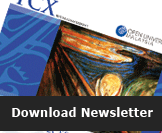Feature: Assessing Prior LearningBy Harvinder Kaur Dharam Singh
Recently, OUM initiated an assessment strategy called Recognition of Prior Learning (RPL). This strategy evaluates the learning which had been achieved earlier against the learning outcomes of a course.
Under this assessment strategy, learners are required to have a portfolio comprising documents, pictures and others to validate the knowledge they acquired through formal and informal training as well as their past experience.
A successful portfolio would be awarded credits.
RPL is an innovative form of assessment which is different from fundamental assessment practices. It would be of particular significance to OUM learners as they are mostly working adults with a lot of learning and experience.
The introduction of RPL serves several purposes. It could help in personal development and career advancement. This is because it could be used to give professional recognition or certification to
individuals working in various fields such as management, IT and nursing
/ health. In the context of OUM, it could be used by learners to enter the University via the Open Entry system in order to further their studies.
There are many benefits to be gained from implementing RPL. It could:
- Enable the completion of formal studies within a shorter time;
- Reduce cost;
- Act as a means to measure admission qualifications (for Open Entry);
- Increase opportunities for further learning;
- Identify gaps in a learner's competence in a particular course; and
- Instil self-confidence and self- worth in learners as well as give more insight into their level
of competence.
OUM stands to gain as well
from the introduction of RPL as this strategy would address its learners'
needs. The University views it as an academically sound assessment
strategy which could provide opportunities to validate employees' value and experience in the industry.
Nonetheless, RPL is not a substitute for the present assessment system at OUM. It is, in fact, part of the University's efforts to provide an assortment of assessment options. This is in line with the University's belief that there is diversity in the needs of its learners and this diversity needs to be encouraged and catered
to.
|

